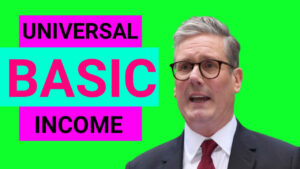Many people in the UK are finding it harder to get by. The rising cost of living, low-paying jobs, and complex benefit rules make life stressful for millions. Even with the support from the Department for Work and Pensions (DWP), over 14 million people are still living in poverty, including more than 4 million children. Clearly, the current welfare system isn’t working well for everyone.
A new idea is gaining attention—Universal Basic Income, or UBI. This is a simple plan where every citizen receives a regular amount of money from the government, without having to meet any special rules. UBI is designed to give people financial security, reduce stress, and support independence, whether they are working, studying, or looking after family.
Across the world, countries like Finland and Canada have already tested UBI. Wales is also running its own UBI trial. The early results show better health, more job stability, and less need for emergency help. As more people talk about changing the way we support each other, it might be time to consider UBI as a better option for the UK.
What Is Universal Basic Income?

Universal Basic Income (UBI) is a policy where every citizen receives a fixed amount of money regularly—usually monthly. This payment is:
- Unconditional – everyone gets it, no matter their job or income.
- For everyone – there is no need for checks or paperwork to apply.
- Reliable – people can plan because they know when and how much they will get.
The goal is to give people enough money to meet basic needs like food, rent, and bills. Unlike current benefits, UBI aims to remove the stress of losing support when circumstances change.
Why the Current System Is Not Working Well
The UK’s DWP offers many benefits like Universal Credit, Personal Independence Payment (PIP), and Jobseeker’s Allowance. But these come with big problems:
- The system is hard to use and takes a long time.
- People must meet strict rules, or they lose money.
- Claimants often feel ashamed or judged.
- Benefits change when income changes, making it hard to plan.
- Some people are unfairly punished or denied help.
These issues leave many families in ongoing financial stress, even when they qualify for support.
UBI in Real-Life Trials
Finland (2017–2018)
- 2,000 jobseekers received €560 a month.
- People reported feeling less stress and better health.
- Some found new jobs or started small businesses.
Ontario, Canada (2017–2019)
- Selected residents received C$1,400 monthly.
- Participants had better health and needed less emergency help.
- The program ended early, but results showed positive outcomes.
Wales (Ongoing since 2022)
- Young care leavers get £1,600 a month.
- Early signs show they’re more independent and less stressed.
These tests show that UBI can improve lives, even in a short time.
Can the UK Afford UBI?
Some people worry UBI is too costly. But experts have ideas for how to pay for it:
- Higher taxes on the wealthy and big companies.
- Taxes on pollution and carbon emissions.
- Less money spent on managing the current complex system.
- Taxes on large inheritances or luxury properties.
One report said a national UBI program could cost £427 billion a year—but much of this could be recovered through savings and a stronger economy.
Concerns About UBI—and the Answers
- Will people stop working?
Trials show most people still work. Some even start businesses or return to school. - Will prices go up?
With smart planning and rules, the risk of inflation can be controlled. - Shouldn’t only poor people get help?
Making it universal means no one is left out or judged. Everyone gets the same basic support.
Why UBI Could Help Everyone
In 2023, UK families faced some of the toughest financial times in years:
- Inflation reached 11.1%.
- London rent went over £2,000 per month.
- Food bank use rose by 33%.
UBI could protect people from falling into deep poverty during hard times. It would make sure no one is left behind, even if they lose their job or can’t work for health reasons.
A Step Toward a Better System
UBI might not be perfect, but it offers a real chance to fix what’s broken. It’s simple, fair, and helps everyone live with dignity. With smart funding and good planning, the UK could replace today’s complex benefit system with something that actually works for the people.
As jobs and prices change in the future, it’s time to think boldly. Universal Basic Income could be the change that creates a more secure and fair society for all.